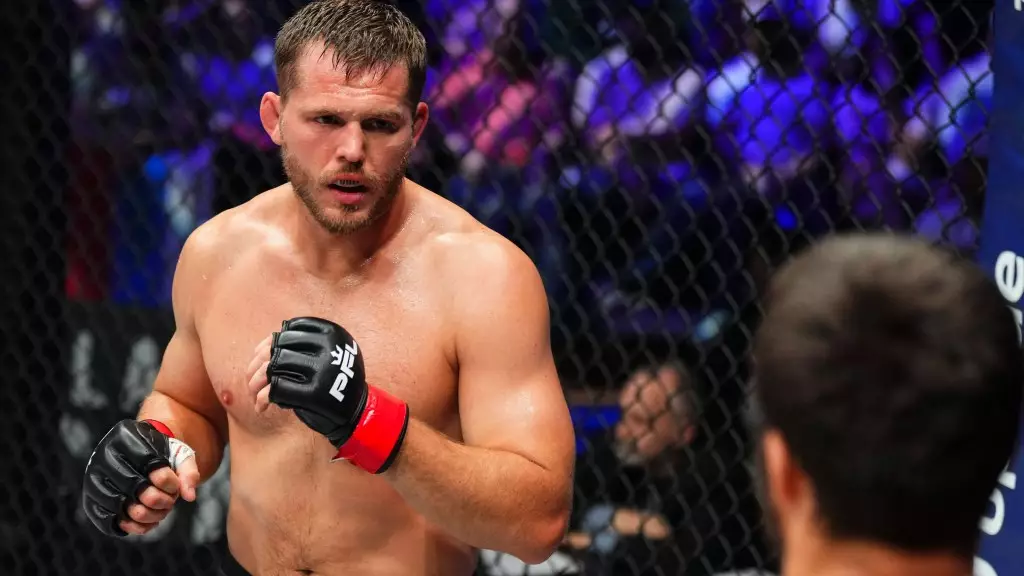Logan Storley’s journey through the mixed martial arts (MMA) landscape presents a compelling narrative of highs and lows, reflective of the sport itself. Born with a tenacious spirit, Storley’s wrestling pedigree, honed at the University of Minnesota, set the stage for an illustrious, albeit tumultuous, MMA career. Starting with an impressive initial record, including a remarkable 11-0 before facing any setbacks, Storley’s career seemed to follow a fairy-tale arc. Yet, like many athletes in combat sports, he has encountered formidable obstacles that could easily discourage the less resilient.
The profound essence of persistence is embedded in Storley’s recent experiences. After an unblemished start, he faced Yaroslav Amosov, in what was presumably a promising bout, but ended in a split decision loss during an unprecedented time of pandemics. Each subsequent match brought its own trials—victory shimmering tantalizingly close with a split decision win over the flashy Michael Page for an interim title, only to be countered by further disappointment against Amosov in their title unification fight.
What stands out in Storley’s narrative is how setbacks have not diminished his fervor; rather, they have propelled him into a reflective space. After a series of missteps during his stint in the PFL, including a shocking knockout loss to Shamil Musaev, Storley confronted a reality that demanded introspection and reinvention.
Learning from Loss: A Journey of Reinvention
Assuredly, losses can haunt an athlete, but for Storley, they served as catalysts for growth. Despite his 5-3 record in recent fights, characterized by unfortunate title fight defeats, Storley has approached his challenges with a refreshing perspective. In a candid conversation with MMA Junkie Radio, he reflected on his defeats, noting that his opponents were champions at their peak, possessed of pristine records. This acknowledgment hints at a maturity underserved by many fighters; he is not merely focused on the number of losses, but rather on the lessons contained within each fight.
Storley acknowledges the importance of refining his skills, returning to fundamental techniques and expanding his fighting arsenal. Such an approach speaks volumes about the character of the man within the fighter. In a sport often defined by brute force and charisma, the willingness to embrace vulnerabilities and articulate a plan for personal development differentiates Storley from his peers. He comments, “We went back to the drawing board… and be great at those things,” underscoring his commitment to self-improvement.
His forthcoming bout against Magomed Umalatov in the PFL’s 2025 welterweight tournament epitomizes this commitment. Unlike previous seasons, this is a single-elimination tournament, intensifying the stakes while offering an opportunity to showcase his evolved fighting style. Storley understands that this fight is crucial—failure would mean another year of stagnation, while success could reignite his ascent in the competitive MMA arena.
The Underdog Mentality: More than Just Money
While the MMA landscape often glorifies monetary rewards, Storley reveals a deeper passion—one rooted in a quest for greatness rather than financial gains. His background as a wrestler sheds light on this compelling mentality. He speaks of pursuing excellence for the love of the sport, an inherent drive to cement his legacy rather than a simple yearning for fame. “You didn’t get into wrestling for money,” he states, touching on a sentiment that resonates with many who have spent years in sports, often forgoing financial prosperity for passion and dedication.
As he transitions into this new phase in his career, his outlook is one of humility tempered with ambition. He carries the scars of previous battles but wears them as badges of honor, recognizing that each conflict shapes his persona both inside and outside the octagon. While younger fighters might chase lucrative contracts and flashy accolades, Storley’s ethos centers on the notion of crafting a narrative of resilience—one that transcends wins and losses.
At 32, Storley is not merely prepared to rise; he aims to redefine himself in the process. The impending fight against Umalatov at Kill Cliff FC, juxtaposed against Umalatov’s training at American Top Team—a rival camp—adds another layer of motivation. Here lies an opportunity not just for a victory, but for legacy. As he steps into the octagon, Storley embodies the essence of a prizefighter not just in pursuit of riches, but for the ethereal reward of being remembered as one of the sport’s finest.

